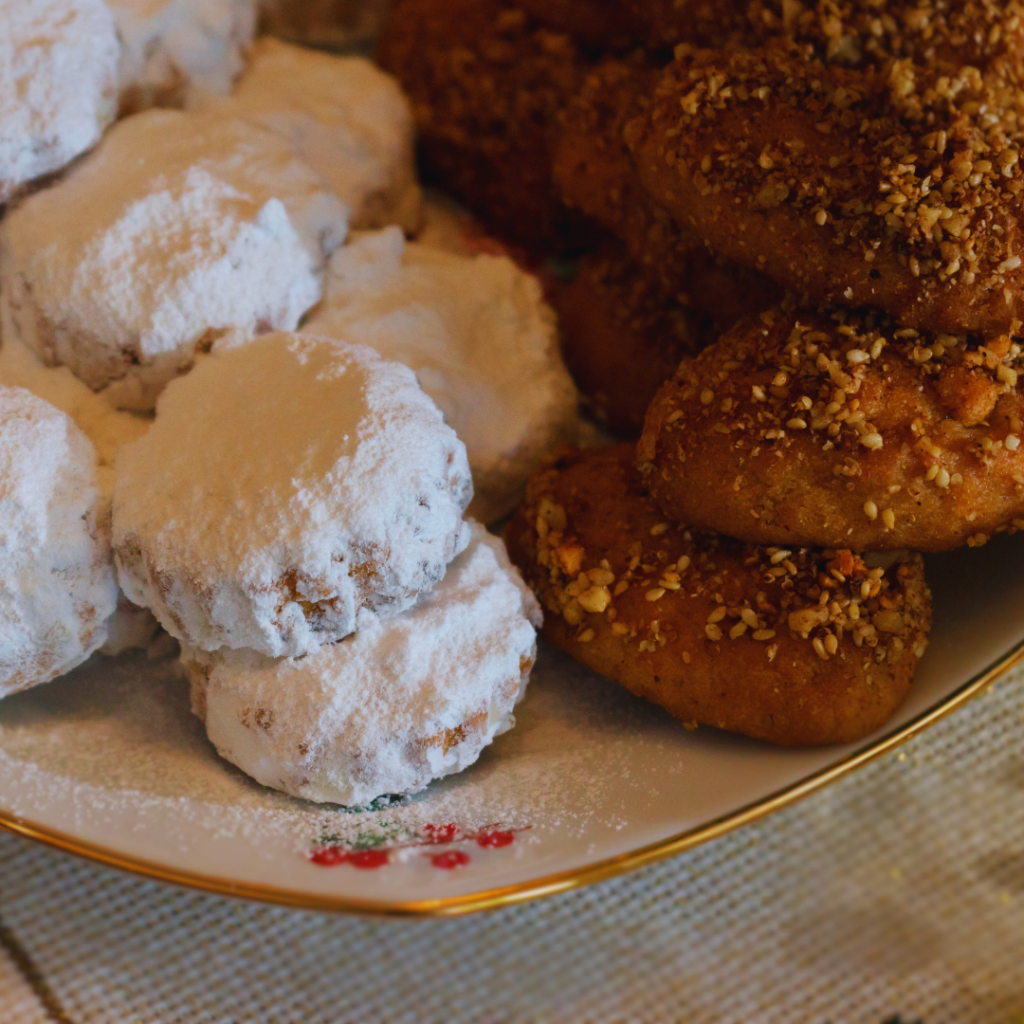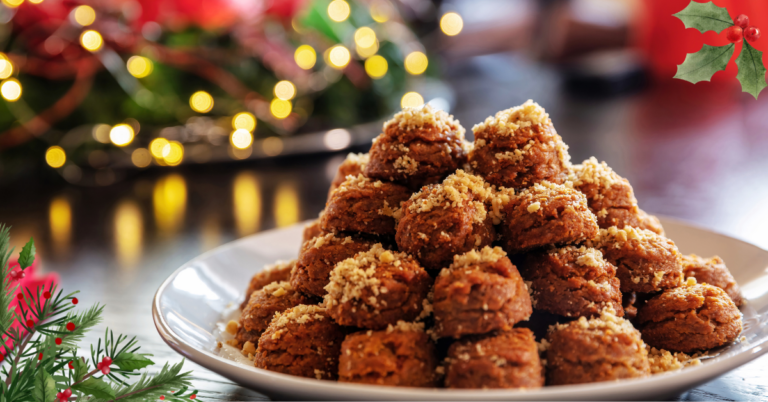It’s that time of year again. Malls are a madhouse, and the post office is running on fumes. Tannenbaums are huddled closely together in flocks, waiting to be chosen as this year’s Family Christmas Tree. Moms and dads alike are throwing out their back muscles as they strain to get the lights hung just so, and all of us are anxiously balancing our checkbook, hoping we’ll be able to make the rent come New Year’s Day. Stockings are hung by chimneys with…relative fire safety measures in place, and for the remainder of the year, you can’t enter a single store without hearing some variation of a holiday pop standard.

But across the Aegean Sea, the holiday season is in full swing. Lights illuminate the winter nights, and yes, even the illustrious Christmas tree can be found in homes and public squares alike. Presents are purchased and the overall excitement for the holiday is just as palpable, but there are many beautiful traditions that you wouldn’t find anywhere else. Though the summer fun grinds to a halt in December, the unique beauty and wonder found in the Greek islands transforms both Crete and Rhodes from a sunny paradise into a wintery wonderland. So come wander with Wine Dark Sea Villas into the wonderful world of Christmas.
Food
For those of us in the United States, the idea of fasting between now and Christmastime seems like someone’s horrible dream. The weeks leading up to Christmas are usually filled with parties, family get-togethers, even the ubiquitous ‘Friendsmas’ party, all brimming with homemade dishes of both the savory and sweet variety. But for the Greek people, the days leading up to Christmas involve fasting, not stuffing their face with…stuffing. From November 15th to December 24th, the people of Greece dine on only fish, except for certain days where they sacrifice even that. On fishless days, the people of Crete and Rhodes dine on a bean dish made with raisins and honey, and after December 17th, they abstain from fish completely as well. During this time even wine is verboten, and not simply because it is viewed as a luxury. In the orthodox tradition, foods that contain blood (or are historically stored in animal hides, such as wine used to be), are to be abstained from until the period of fasting ends.

However, when the fast is broken on Christmas Day, the people of Crete and Rhodes indulge in a period of great feasts and fine sweets. In fact, since gifts are not actually exchanged on Christmas Day, the focus of the day revolves more around the feasting and friendly gathering, making food the star of the hour. Though traditional Greek foods are often found in abundance, with a Christmas lamb roast usually being the feature on the menu, the people of Crete include a delectable smoked pork, called apaki. There is a longstanding tradition of featuring pork dishes for Christmas for the Cretans, from flavorful sausages to the tsigarides, a kind of crispy suet fried with spices and lemon juice, and even omathies, a regional dish found in Lasithi made from pig intestines stuffed with rice, raisins and liver.
Meanwhile, in Rhodes, families roast turkey in addition to the more typical Greek fare. Families gather in droves for festivities that usually include feasting and general making merry, and to exchange some of their favorite holiday sweets. Like families all across the country, the citizens of Rhodes busy themselves with baking special holiday cookies, Melomakarona and Kourabiedes. Melomakarona are egg-shaped cookies made from flour, olive oil and honey, and are usually flavored with sugar, orange zest, cognac and cinnamon, while Kourabiedes are buttery almond cookies flavored with brandy and vanilla, then sprayed with rose water and topped with powdered sugar after baking. And, of course, one can’t forget the Christopsomo, a special Christmas bread that translates to ‘bread of Christ.’ Much like a hot cross bun, this loaf has a large decorative cross of dough baked across it, and sometimes contains walnuts or an egg at the center.

The highlight of holiday sweets, however, is the Vasilopita. Baked all across the country, this special cake is actually served on New Year’s Day in honor of St. Vasilios, (or St. Basil). Similar to the King cake, this celebratory baked good contains a hidden coin suspended in the dough. As the cake does have religious significance, the first few slices are reserved for Jesus, the Virgin Mary, the Poor, and the House, respectively. This orange flavored cake is then distributed to all, oldest to youngest, all hoping that they will be the lucky recipient of the slice containing the hidden coin. Whoever finds it wins a small prize, but more importantly is said to have good luck for the coming year.
Traditions
Many know that the origins of the Christmas tree began in Germany, and became popularized when Queen Victoria had one installed in her palace to make her husband feel more at home during the holiday season. But the use of the Christmas Tree was not a popular holiday decoration until King Otto of Bavaria brought them to the country in 1833. Today, of course, the tree is much more commonplace on the mainland, but the original central decoration, the Karavaki, still holds sway in the Greek Islands.

Though the central saintly gift-giver is not St. Nicholas in the Orthodox tradition, he is still a prominent figure throughout Greece as he is the patron saint of Sailors. His feast day falls on December 6th, and though this is still a period of fasting for Christmas, people take time to celebrate by decorating boats for Christmas. Literally translating into ‘little boat,’ a Karavaki is decorated and displayed from now until January 6th, which is the feast of the Epiphany and the 12th and final day of Christmas.
Besides the prominently featured and festively colored sailboats, Crete also has Christmas markets in Eleftherias Square where crafts, bougatsa, and mulled wine are sold. From 2018-2022, an official Santa Run was held on the 26th of December in the port city of Chania. Though the run may not be happening this year, it’s still worth a visit to see the old Venetian port decked out in lights, with an illuminated Christmas tree opposite the lighthouse. If you happen to be staying with us at Wine Dark Sea Villas during this period, there’s a good chance you might hear groups of children who are singing kalanda, or Christmas Carols. They often go door to door in the villages with nothing but their voices and their triangles, and usually receive little gifts like coins or fruit.

But what about the Christmas goblins, you ask? That’s right: while Wales has the Mari Lwyd and Germany the Krampus, Greece has the Kallikantzaroi. It is said that these mischievous, vile-hearted goblins live underground every day of the year, working every day at sawing through the trunk of the great World Tree, whose trunk keeps the earth from collapsing. However, during the 12 Days of Christmas, these goblins lay down their tools, tempted by the frivolity taking place on the surface (and because this period takes place between Christ’s birth and his baptism, thus giving room for chaos), and wreak havoc above ground. During this time, sweets may be stolen and things may run amok in general, but there is a way to combat these seasonal tricksters: Kallikantzaroi cannot count above the number three, and in fact struggle to even say the number aloud due to it being connected with the Holy Trinity. All one has to do to thwart these little goblins is to leave an overturned colander near their front door. The goblins become so focused on trying to count the holes all night, having to constantly restart once they hit ‘three,’ that they are busy all night and thus cannot cause mischief. Though this may seem like the opposite of a good thing, their absence allows the World Tree’s trunk to heal completely. When the kallikantzaroi are banished once again beneath the earth’s crust, they must begin sawing all over again.
New Year’s Day
Religiously speaking, Christmas is a minor holiday, especially when juxtaposed with the most important holiday of Easter. However, Greeks love to celebrate the entire 12 Days of Christmas, and though their gift-giving day does not fall on the 25th of December, they still have a special day reserved for presents. Across the mainland and the islands, gifts are exchanged on New Year’s Day in honor of the Greek Santa Claus, Agios Vassilios, or Saint Basil of Caesarea. Born in Pontus in the year 330 A.D., St. Basil was born to a life of wealth and privilege. During his lifetime, though, he gave away all of his earthly possessions and fortune to the poor and needy, and turned his family estate into a monastery, writing extensively on the importance of monastic life. Though St. Nicholas, also of Greek origin, did give away many gifts to the poor in secret, his importance to the Greeks lies in his patronage of sailors, and less on his gift-giving. St. Basil also gave away money in secret to the overtaxed poorer families, but his method (according to folklore) was to bake the money into cakes, surprising families who cut into them, hence the origin of the aforementioned Vasilopita.

Though New Year’s Day is the big gift-giving day, it is also a day seen as a chance to renew or bring in good luck to the family with the ceremony called Pothariko. After New Year’s mass, the families have pomegranates blessed by the priest. When the family returns home, a family member breaks the blessed pomegranate on the doorframe or door. Traditionally speaking, it is usually the man of the house who gets to smash the pomegranate, but it can also be the person that the house considers luckiest, or simply the eldest family member. Whoever it is must then enter the house with their right foot, as if starting their entire household’s year on the ‘right’ foot, and tradition states that this ensures your year will be blessed. Of course, whoever has to clean that red stain out of the door frame probably doesn’t feel so lucky.
The Christmas season is a wonderful and unique time for all of Greece, but especially in the Greek Islands. For a place that shines so brightly in the summertime, it’s wonderful to see how magical and special a place it is during the holiday season. Though are customs may be different, and though this time may mean different things to us all, there is the promise that this season brings of hope and love that is strong enough to unite us all and bring peace on earth and goodwill to all men. For just a little while, we can come together and hope that the new year will bring us a little luck and a little peace, and most importantly, give as much of that love and peace as we receive. But for now, as you gather with your loved ones, be they friends, family members or a spouse, let me be the first to wish you a very Kala Christouyenna!
Merry Christmas, from all of us at Wine Dark Sea Villas.
By Katarina Kapetanakis

